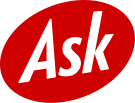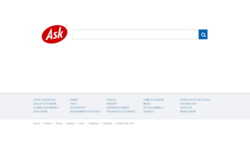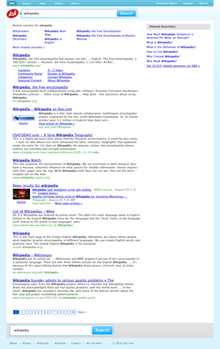Ask.com
E-business From Wikipedia, the free encyclopedia
E-business From Wikipedia, the free encyclopedia
Ask.com (known originally as Ask Jeeves) is an internet-based business with a question answering format initiated during 1996 by Garrett Gruener and David Warthen in Berkeley, California.
 | |
 | |
| Type of business | Subsidiary |
|---|---|
Type of site | Answer engine |
| Available in | English |
| Founded | June 3, 1996 (as Ask Jeeves) February 2006 (as Ask.com) |
| Headquarters | 555 City Center Oakland, California, U.S.[1] |
| Owner | IAC |
| Created by | Garrett Gruener David Warthen (Founders) Douglas Leeds (CEO) |
| Parent | Ask Media Group, LLC |
| URL | ask.com |
| Registration | Optional |
| Current status | Active |
The original software was implemented by Gary Chevsky, from his own design. Warthen, Chevsky, Justin Grant, and others built the early AskJeeves.com website based on that core program. In 2006, the "Jeeves" name was discontinued and they emphasized use of the search engine, which had its own algorithm.[2] In late 2010, with insurmountable competition from more popular search engines like Google, the company outsourced its web search technology and revived its function a question and answer site.[3] The business's president, Douglas Leeds became CEO in 2010.[4]
Three venture capital companies, Highland Capital Partners, Institutional Venture Partners, and The RODA Group were early investors.[5] Ask.com is owned currently by InterActiveCorp (IAC), using the Nasdaq symbol Nasdaq: IAC, and its corporate headquarters is located at 555 City Center, in the Oakland City Center development in downtown Oakland, California.

Ask.com was originally known as Ask Jeeves,[6] "Jeeves" being the name of a "gentleman's personal gentleman", or valet, fetching answers to any question asked. The character was named after Jeeves, Bertie Wooster's valet in the fictional works of P. G. Wodehouse.[7]
The original idea of Ask Jeeves was to allow users to get answers to questions in everyday, natural language, and traditional keyword searching. The current Ask.com still provides this for mathematics, dictionary, and conversion questions.
Ask Jeeves was initiated as a beta version during mid-April 1997 and was initiated completely on June 1, 1997.[6]
On September 18, 2001, Ask Jeeves acquired Teoma for more than $1.5 million.[8]
In July 2005, Ask Jeeves was acquired by IAC.[9][10]
In February 2006, the name "Jeeves" was eliminated from Ask Jeeves and the search engine renamed Ask.[2][9]
On May 16, 2006, Ask implemented a "Binoculars Site Preview" into its search results. On search results pages, the "binoculars" let searchers have a preview of the page they could visit with a mouse-over activating a pop-up screenshot.
On June 5, 2007, Ask.com was redesigned with a 3D appearance.[11]
In December 2007, Ask released the AskEraser feature,[12] allowing users to opt-out from tracking of search queries and IP and cookie values. They also announced they would erase this data after 18 months if the AskEraser option was not set. HTTP cookies must be enabled for AskEraser to function.[13][14]

On July 4, 2008, Ask acquired Lexico Publishing Group, which owns Dictionary.com, Thesaurus.com, and Reference.com.[15][16]
In August 2008, Ask initiated the Ask Kids search engine designed for children.[10]
In April 2009, for the UK version of Ask.com, Jeeves was redesigned as a CGI character and the website was named once again Ask Jeeves, though international versions were still just Ask.com.[17] His image remained on the UK website until July 21, 2016, though the Ask Jeeves name would continue to be used until September 21, 2016, when the website was renamed Ask.
On July 26, 2010, Ask.com released a closed-beta Q&A service. The service was released to the public on July 29, 2010.[18] Ask.com initiated its mobile Q&A application for the iPhone during late 2010.[19]
Ask.com reached 100 million global users per month in 2012[20] through its website with more than 2 million downloads of its flagship mobile app in that year.[21] The company has also released additional applications developed from its Q&A experience, including Ask Around[22] in 2011 and PollRoll[23] in 2012.
In 2010, Ask.com discontinued the search function, with the loss of 130 search engineering jobs, because it could not compete against more popular search engines such as Google. Earlier in the year, Ask had initiated a Q&A community for generating answers from real people as opposed to search algorithms, then combined this with its question-and–answer repository, utilizing its extensive history of archived query data to search sites that provide answers to questions people have.[24]
To avoid a situation in which no answers were available from its own resources, the company outsourced to an unnamed third-party search provider the comprehensive web search matches that it had gathered itself.[25]
Ask Sponsored Listings, formerly the direct-sales division for Ask.com, is no longer available, having merged with Sendori, an operating business of IAC, in 2011.[26]

Ask Jeeves, Inc. stock traded on the NASDAQ stock exchange from July 1999 to July 2005, using the ticker symbol ASKJ. In July 2005, the ASKJ ticker was retired upon the acquisition by IAC, valued at US$1.85 billion.
In 2012, Ask.com made two acquisitions as part of a larger strategy to offer more content on the Ask.com website. On July 2, 2012, Ask.com purchased content discovery start-up[27] nRelate for an undisclosed amount. That was followed by the company's acquisition of expert advice and information site About.com, which closed in September 2012.[28]
On August 14, 2014, Ask.com acquired popular social networking website ASKfm, where users can ask other users questions, with the option of anonymity.[29] As of August 14, 2014, Ask.fm had 180 million monthly unique users in more than 150 countries,[30] with its largest user base in the United States.[31] Available on the web and as a mobile app, ASKfm generates an estimated 20,000 questions per minute with approximately 45 percent of its mobile monthly active users logging in daily.[32] As of 2014[update], the mobile app has been downloaded more than 40 million times.[32]
In 2021, Ask re-initiated its function SymptomFind[33] and introduced the new finance-based site Ask Money.[34]
From November 1999, in some areas Ask Jeeves advertised on produce stickers on apples, oranges and bananas. Questions such as "How many calories in a banana?" were printed alongside the Ask Jeeves web address.[35][36]
A Jeeves balloon and a float appeared in the Macy's Thanksgiving Day Parade during 2000–2004.[36][37]
Apostolos Gerasoulis, the co-creator of Ask's Teoma algorithmic search technology, featured in four television advertisements in 2007, extolling the virtues of Ask.com's usefulness for information relevance.[38]
After a hiatus from mass consumer marketing, Ask reinstated its website's format to emphasize questions and answers, and resumed advertising by television during the autumn of 2011.[39] Instead of national advertising, Ask emphasized local markets. During the summer of 2012, initiated a national cinema campaign,[40] along with other out-of-home tactics in certain markets such as New York and Seattle.[41]
As part of a Seattle-based local market effort, Ask.com initiated its campaign "You Asked We Answered"[42] during 2012, in which the company "answered" residents' main complaints about living in their city, including easing morning commutes and stadium traffic, as well as keeping the local Parks and Recreation department's wading pools open.
On January 14, 2009, Ask.com became the official sponsor of 2000 NASCAR Sprint Cup Series Champion Bobby Labonte's No. 96 Ford. Ask would become the official search engine of NASCAR.[43] Ask.com was the primary sponsor for the No. 96 for 18 of the first 21 races and had rights to increase this to a total of 29 races that season.[44] The Ask.com car debuted in the 2009 Bud Shootout where it failed to finish the race, but subsequently returned strongly, placing as high as 5th in a March 1, 2009, Shelby 427 race at Las Vegas Motor Speedway.[45] Ask.com's foray into NASCAR represented the first instance of its venture into what it terms "Super Verticals".[46]
Seamless Wikipedia browsing. On steroids.
Every time you click a link to Wikipedia, Wiktionary or Wikiquote in your browser's search results, it will show the modern Wikiwand interface.
Wikiwand extension is a five stars, simple, with minimum permission required to keep your browsing private, safe and transparent.